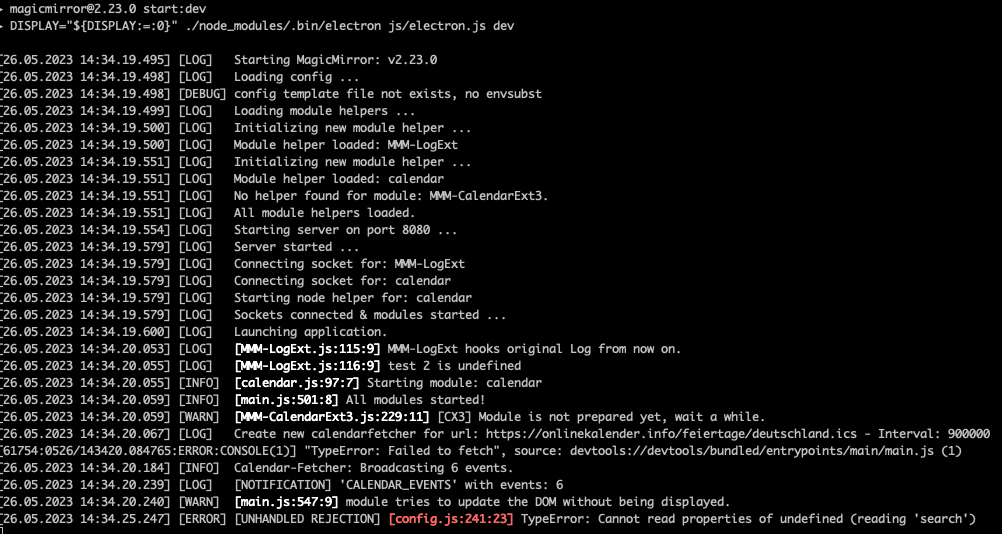Log Extension module for MagicMirror
Many beginners have a problem tracing an unexpected issue when he/she runs the MagicMirror.
Usually, the start of debugging would be to examine backend-log and frontend-log but people may have confusing to use both how to.
I know there already exists MMM-Logging to help with this issue, but it seems not maintained anymore, and I need more features, so I have to re-invent a wheel by myself.
- To deliver frontend log (used by MM's
LogObject) to backend log - Customizable/Decorative Log messages
- To monitor Notifications
window.errorandunhandledRejectionwould be caught then transmit to the backend- To be able to log external messages from other programs or devices via HTTP request
IMPORTANT : This module deliver only
Log.xxx()to the backend, notconsole.xxx().
cd <YOUR_MAGIC_MIRROR_DIRECTORY>/modules
git clone https://github.com/MMRIZE/MMM-LogExt{
module: "MMM-LogExt",
config: {}
},This would be enough for most light users. You don't have to read furthermore. :D
Put this module on top than other modules in config as far as possible.
Here are additional options to config
| property | default | description |
|---|---|---|
| echo | true |
Whether to show log in front also. false will not show the log in front. |
| notificationMonitor | callback Function | See the notification part |
| beforeContext | callback Function | See the decoration part |
| afterContext | callback Function | See the decoration part |
| replaceJSON | callback Function | See the replaceJSON part |
You can pour some sugar on original contenxt with beforeContext and afterContext callback function.
beforeContext: function (msg) {
return `[${msg.method}]`
}
afterContext: function (msg) {
return `at (${msg.location})`
}
// Log.warn('hello')
// => [warn] hello at (xxxx.js:123:12)- method : which member method function of
Logcalled. (log,warn,error, ...) - location : the location of
Logcalled. (filename:lines:columns) - stack : If availabe, the caller stack array
- context : arguments of the
Logcall. (You don't need to include context in these function, because context itself will be inserted between these two return values automatically)
If you don't need any decoration, just return '' or beforeContext: false (or any value not function)
You can monitor notification with this callback funciton
notificationMonitor: (notification, payload, senderName) => {
if (senderName === 'calendar') return `'${notification}' with events: ${payload.length}`
return ''
}
// => 'CALENDAR_EVENTS' with events: 10Usually there would be too many notifications, so, you'd better to filter out specific notifications with notification, payload, senderName conditions to get proper target notification only.
Logging is usually not regarded for inspection/watch the complex data value. This module generally deliver simplified data to backend log through JSON.stringify() So, Function, Symbol or undefined will not be transmitted to the backend. (It would be converted to null or equivalents.), and some complex-nested object might be also.
When you need more detailed information of those kinhds of values, you can use replacer of JSON.stringify to extend the features.
replaceJSON: (key, value) => {
if (typeof value === 'undefined') return `${key} is undefined`
return value
}
// Log.log('hello', this.config?.foo)
// => hello 2 is undefined
// 'key' would be index of array or key of object or something. In this example, `this.config?.foo` is 2nd argument of log calling. Ref. https://developer.mozilla.org/en-US/docs/Web/JavaScript/Reference/Global_Objects/JSON/stringify
When you need to aggregate some Log from external program or device, it could be done with simple POST request.
curl -d '{"method":"info", "context":"HomeAssistant is activated."}' -H "Content-Type: application/json" -X POST http://localhost:8080/logext
# => HomeAssitant is activated.- Released
- Seongnoh Yi ([email protected])

